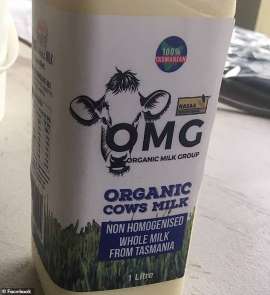Tag Archives: Australia
FDA seeking source of imported melons in Salmonella outbreak
When Listeria killed seven people in Australia last year, linked to rockmelon (cantaloupe for you North American types) growers acted like it never happened before and just wanted to get product back on shelves.
 They should never be cut in half, although all retailers do it, and it’s just greed over public health.
They should never be cut in half, although all retailers do it, and it’s just greed over public health.
In the fall of 2011, 33 people were killed and 147 sickened from Listeria linked to cantaloupe in the U.S.
And it keeps happening.k on
The number of people with salmonella linked to fresh-cut melons shipped by Caito Foods has increased, and the Food and Drug Administration has released a list of hundreds of retail outlets that received the products.
The exact source of the imported melons, however, has not been released, and the FDA continues its traceback investigation.
The FDA expanded the list of private-label brands in the outbreak, which was first reported by the FDA on April 12. In its first update on the outbreak, the FDA on April 24 posted the locations of almost 1,500 retail locations that received the fresh-cut cantaloupe, honeydew and watermelon products from Caito Foods, Indianapolis.
The Centers for Disease Control and Prevention also reported April 24 that the number of people who have become ill has risen from 93 to 117 in 10 states. PulseNet, a national network that allows health and regulatory agencies to identify outbreaks, first alerted the CDC about the outbreak on April 2.
The CDC reported illness onset dates range from March 4 to April 8. No deaths have been reported; 32 people have been hospitalized, according to the CDC.
The type of salmonella in the outbreak, Salmonella Carrau, is rare, historically seen in imported melons. Caito Foods told investigators the melons used in the products were imported, according to the FDA.
Caito Foods was linked to a similar outbreak in 2018 involving Salmonella Adelaide in fresh-cut melon products.
How things are done in Australia: Redback spider eats deadly snake
 A member of the Facebook group Brisbane Snake Catchers confirmed, “Many people would think this would be an unlikely event, but it is a fairly common occurrence, just not witnessed by the public often.”
A member of the Facebook group Brisbane Snake Catchers confirmed, “Many people would think this would be an unlikely event, but it is a fairly common occurrence, just not witnessed by the public often.”
Sorta like food safety.
Australia still has an egg probem: 51 sick from Salmonella at bakery
Brad Crouch of The Advertiser writes that raw eggs are to blame for a salmonella outbreak that so far has left 51 people sick including 19 admitted to hospital.
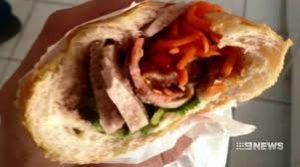 A SA Health investigation into the outbreak linked to three Angkor Bakery stores has found the likely source of contamination related to handling of raw egg products.
A SA Health investigation into the outbreak linked to three Angkor Bakery stores has found the likely source of contamination related to handling of raw egg products.
SA Health’s Acting Director of Public Health Services, Dr Fay Jenkins, said a number of food and environmental samples collected from all stores last week returned positive results for Salmonella.
“Given the sample results and the strain of the Salmonella outbreak, it is most likely that the cause of contamination was related to handling raw egg products,” Dr Jenkins said.
“The owners of the Angkor Bakery stores continue to work closely with the local councils and SA Health to improve their practices, and all three bakeries closed voluntarily during the investigation.”
“Many food poisoning outbreaks have been associated with foods containing raw or partially cooked eggs such as aioli, mayonnaise, hollandaise or tartare sauce and mousse,” Dr Jenkins said.
“The external shell of eggs may contain harmful bacteria such as salmonella, and while eggs may not necessarily look or smell ‘off’ they may be contaminated.
“It’s important to check that eggs are clean and not cracked or dirty — and those that are should be thrown out.
Lakhina Eung, the shop owner of the bakery in Burton, told ABC News she was sorry to anyone impacted by the outbreak and hoped the community would still support the business.
“I couldn’t sleep for over three days now so it’s been stressful,” she said.
“I am really sorry to everyone that is affected and also I hope that the community will still be supportive to us and our customers [will] still support us.
“I hope that the public and the community still trusts us and we [will] try our best to do everything as the council and SA Health require.”
As soon as you learn some basic microbiology and don’t make customers barf.
A table of Australian egg-related outbreaks is available at https://barfblog.com/wp-content/uploads/2017/05/raw-egg-related-outbreaks-australia-5-1-17.xlsx.
And to Dave, Sophie and Carol, who told me in the past week to stop pissing in the wind, this is for you.
It was probably the raw egg butter: 11 sick with Salmonella, Australia still has an egg problem
SA Health has confirmed 11 cases of salmonella have been reported after people ate Vietnamese rolls from three Angkor Bakery stores.
 Deputy chief medical officer Dr Nicola Spurrier said that of those eleven people, nine were hospitalised due to the severity of the poisoning.
Deputy chief medical officer Dr Nicola Spurrier said that of those eleven people, nine were hospitalised due to the severity of the poisoning.
“Early investigations indicate the cases could be linked to raw egg butter, pate or BBQ pork ingredients.
“The businesses complied with a council request on Tuesday to cease using these ingredients and, from today, the businesses have agreed to cease selling all Vietnamese rolls until the source has been identified.
“Cleaning and sanitising procedures have also been assessed and improved,and will continue to be monitored.”
An updated table of raw-egg related outbreaks in Australia is available at raw-egg-related-outbreaks-australia-2-3-2019
BS: Report says poor regulation contributed to Australia strawberry tampering crisis
A new report into Australia’s 2018 strawberry tampering crisis, which caused catastrophic economic damage to the industry, has found food-tracing protocols need to be strengthened.
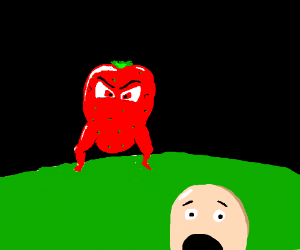 Lucy Stone of The Sydney Morning Herald reports the report also found that food safety expertise in the horticulture industry was “variable” due to there being many small businesses, with no regulatory or industry oversight particularly for strawberry farmers (uh, I’m right here).
Lucy Stone of The Sydney Morning Herald reports the report also found that food safety expertise in the horticulture industry was “variable” due to there being many small businesses, with no regulatory or industry oversight particularly for strawberry farmers (uh, I’m right here).
The “fragmented nature” of the sector also complicated matters with no regulation tracking strawberry farm locations during the crisis, and the use of seasonal or contract pickers muddying traceability.
Food Standards Australia New Zealand (FSANZ) was commissioned by Health Minister Greg Hunt to review the response to the strawberry contamination crisis, which began on September 9 when a man swallowed a needle hidden inside a strawberry.
Within days more reports had been made to Queensland Health and Queensland Police of similar incidents, sparking copycat actions of needles being hidden in fruit across Australia and New Zealand.
The crisis saw strawberry production nationally grind to a halt, with Queensland growers dumping thousands of tonnes of fruit that could not be sold.
A Caboolture woman, 50-year-old strawberry farm supervisor My Ut Trinh, was arrested and charged with six counts of food tampering, ending the crisis.
But is more regulation and oversight really gonna stop someone driven by demons from inserting needles into produce?
Is there a better approach to both protect and enhance consumer confidence in the wake of an outbreak, tampering, or even allegations of such?
On June 12, 1996, Dr. Richard Schabas, chief medical officer of Ontario (that’s a province in Canada), issued a public health advisory on the presumed link between consumption of California strawberries and an outbreak of diarrheal illness among some 40 people in the Metro Toronto area. The announcement followed a similar statement from the Department of Health and Human Services in Houston, Texas, which was investigating a cluster of 18 cases of cyclospora illness among oil executives.
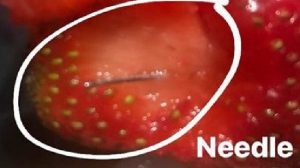 Turns out it was Guatemalan raspberries, not strawberries, and no one was happy.
Turns out it was Guatemalan raspberries, not strawberries, and no one was happy.
The initial, and subsequent, links between cyclospora and strawberries or raspberries in 1996 was based on epidemiology, a statistical association between consumption of a particular food and the onset of disease.
The Toronto outbreak was first identified because some 35 guests attending a May 11, 1996 wedding reception developed the same severe, intestinal illness, seven to 10 days after the wedding, and subsequently tested positive for cyclospora. Based on interviews with those stricken, health authorities in Toronto and Texas concluded that California strawberries were the most likely source. However, attempts to remember exactly what one ate two weeks earlier is an extremely difficult task; and larger foods, like strawberries, are recalled more frequently than smaller foods, like raspberries.
By July 18, 1996, the U.S. Centers for Disease Control declared that raspberries from Guatemala — which had been sprayed with pesticides mixed with water that could have been contaminated with sewage containing cyclospora — were the likely source of the cyclospora outbreak, which ultimately sickened about 1,000 people across North America. Guatemalan health authorities and producers vigorously refuted the charges. The California Strawberry Commission estimated it lost $15-20 million in reduced strawberry sales.
The California strawberry growers decided the best way to minimize the effects of an outbreak – real or alleged – was to make sure all their growers knew some food safety basics and there was some verification mechanism. The next time someone said, “I got sick and it was your strawberries,” the growers could at least say, “We don’t think it was us, and here’s everything we do to produce the safest product we can.”
That was essentially the prelude for the U.S. Food and Drug Administration publishing its 1998 Guidance for Industry: Guide to Minimize Microbial Food Safety Hazards for Fresh Fruits and Vegetables. We had already started down the same path, and took those guidelines, as well as others, and created an on-farm food safety program for all 220 growers producing tomatoes and cucumbers under the Ontario Greenhouse Vegetable Growers banner. And set up a credible verification system involving continuous and rigorous on-farm visits: putting producers in a classroom is boring, does not account for variations on different farms and does nothing to build trust. Third-party audits can be hopeless indictors of actual safety on a day-to-day basis and generates the impression that food safety is something that can be handed off to someone else.
The growers themselves have to own their own on-farm food safety because they are the ones that in the marketplace. Bureaucrats will still have their taxpayer-funded jobs, farmers lose.
There is a lack – a disturbing lack – of on-farm food safety inspection; farmers need to be more aware of the potential for contamination from microbes (from listeria in rockmelon, for example) as well as sabotage.
There is an equally large lack of information to consumers where they buy their produce. What do Australian grocery shoppers know of the food safety regulations applied to the produce sold in their most popular stores? Do such regulations exist? Who can they ask to find the answers?
The Sydney Morning Herald also notes that in the report published on Friday, FSANZ made several recommendations to prevent similar crises in the future, including greater regulation for the industry.
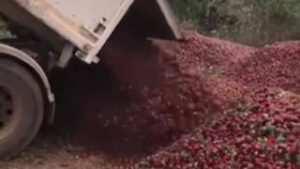 The lack of a peak soft fruits regulatory body left the small Queensland Strawberry Growers Association “inundated with calls”, while national horticulture body Growcom later helping manage communication.
The lack of a peak soft fruits regulatory body left the small Queensland Strawberry Growers Association “inundated with calls”, while national horticulture body Growcom later helping manage communication.
The crisis prompted Prime Minister Scott Morrison to announce legislation to extend the jail time for anyone convicted of food tampering to 15 years.
Police handled more than 230 reports of fruit sabotage across Australia, across 68 brands, with many reports of copycats and hoaxes.
Food Standards Australia New Zealand made seven recommendations in its final report, including a recommendation that all jurisdictions review food incident response protocols.
A central agency should be engaged to manage national communication in future food tampering incidents, and communication between regulators, health departments and police should be reviewed, the organisation found.
Triggers for “activation and management of intentional contamination of food” under the National Food Incident Response Protocol (NFIRP) should also be reviewed.
This recommendation was despite the NFIRP not being activated during the strawberry contamination issue. The protocol is a national incident response that can be activated by any agency to manage food incidents.
“Due to the unique criminal nature of this case and associated investigation, the protocol was not triggered,” the report said.
The horticulture sector also needs a representative body to “support crisis preparedness and response”, and traceability measures to track food through the sector needed greater work.
 “Government and industry should work together to map the current state of play and identify options and tools for enhancing traceability,” the FSANZ report recommended.
“Government and industry should work together to map the current state of play and identify options and tools for enhancing traceability,” the FSANZ report recommended.
A single national website for food tampering should be set up to give the public clear information, the report found.
The report found greater regulation of the horticulture sector was needed and cited the complexity of small farm and distribution operations as making the investigation difficult.
A suggestion that strawberry farms should be fitted with metal detectors also raised concerns about cost and practicality, while tamper-proof packaging risked shortening shelf life, and criticisms about increased use of plastic packaging.
For 20 years, I have been advising fruit and vegetable growers there are risks: Own them: Say what you do, do what you say, and prove it. The best producers or manufacturers can do is diligently manage and mitigate risks and be able to prove such diligence in the court of public opinion; and they’ll do it before the next outbreak.
E. coli in organic milk, kefir, sparks two separate recalls in Australia
Mungalli Creek Kefir 1 L has been recalled in Cairns and Townsville due to the possible presence of E. coli, while Organic Milk Group is recalling OMG Organic Milk 1 L in Tasmania with a best before date of February 4, 2019, also for the possible presence of E. coli.
No info on what type of E. coli was found.
Australia still has an egg problem, state of New South Wales trying to do something about it
The NSW Food Authority is urging people to check their kitchens for any eggs that are marked with the identifying stamp BEC or BEC115 because they may be contaminated with a particular type of Salmonella.
 The stamp BEC or BEC115 will be found on the shell of individual eggs, not on the carton.
The stamp BEC or BEC115 will be found on the shell of individual eggs, not on the carton.
NSW Food Authority CEO Dr Lisa Szabo said thanks to mandatory egg stamping required in NSW, the Food Authority has been able to isolate the particular batch of eggs.
“All other eggs are safe to eat, provided people exercise the usual caution required for a special care food like eggs such as washing your hands and avoiding raw egg products particularly if you are a vulnerable population such as the immune compromised, under two or over 70 years of age or pregnant,” Dr Szabo said.
(That means asking at a restaurant or catered meal if the aioli or mayonnaise served with many dishes, especially great Australian seafood, was made with raw or pasteurized eggs, or was commercially purchased.)
“It is important to know that not all eggs are impacted but if you have any stamped with BEC or BEC115 we recommend as a precaution that you discard them.
“We typically see a rise in Salmonella during the warmer summer months, so this is an opportune time to remind people to practice good hygiene generally when preparing food and to always keep their hands, surfaces and utensils clean and dry before and after handling eggs.”
 NSW Health data indicates that during January 2019, 412 cases of Salmonella infection have been notified, which is similar to the number notified during January in recent years. Children under 5 years of age account for most cases notified this month, although all age groups are affected.
NSW Health data indicates that during January 2019, 412 cases of Salmonella infection have been notified, which is similar to the number notified during January in recent years. Children under 5 years of age account for most cases notified this month, although all age groups are affected.
The NSW Food Authority placed a Prohibition Order on the business that produced the eggs earlier in January preventing them from selling eggs while the possible Salmonella contamination was investigated.
“While it is likely that most affected eggs are no longer in the supply chain, it is possible that people may have purchased them earlier and still have some at home in the fridge or pantry,” Dr Szabo said.
“We’d just like people to check and if they do have any eggs stamped BEC or BEC115 to throw them out to avoid any risk of food poisoning.”
Further information about how to reduce your food safety risk when consuming eggs can be found at www.foodauthority.nsw.gov.au/eggs
An updated table of Australian egg-related outbreaks) is available here.
‘Rusty’ thumbtack found inside NZ blueberry dessert
As the needle-in-produce saga in Australia subsides, it has spread to New Zealand, probably by dim-witted copycats.
 Zoe Hunter of the New Zealand Herald reports a batch of blueberries has been removed from supermarket shelves after a Tauranga man believes he found a “rusty” thumbtack inside the small fruit.
Zoe Hunter of the New Zealand Herald reports a batch of blueberries has been removed from supermarket shelves after a Tauranga man believes he found a “rusty” thumbtack inside the small fruit.
The man, who would only be named as Mr Osborne, was celebrating his wife’s birthday at his mother-in-law’s home last night and took the last mouthful of his dessert when he bit into a thumbtack.
“Luckily I bit into it sideways and spat out the tack,” he said.
He believes the thumbtack was inside one of the blueberries that his mother-in-law used in her cake recipe.
“It seems pretty well thought out because when I pushed it into the side of the blueberry you couldn’t see it,” he said. “It was rusty and slightly bent.”
The man had learned blueberries were a good snack for dogs and he and his wife had just got a new puppy.
“Lucky I did not give it to my dog,” he said.
After the incident, Osborne put the blueberry and thumbtack inside a ziplock bag and notified supermarket staff, who he said had handled the complaint well.
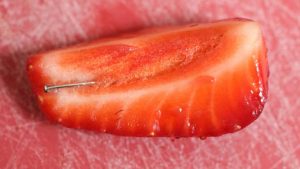 Osborne said his mother-in-law had bought the punnet of blueberries from Pak’nSave in Pāpāmoa on January 21.
Osborne said his mother-in-law had bought the punnet of blueberries from Pak’nSave in Pāpāmoa on January 21.
He had posted his find on Facebook to warn people about checking their fruit thoroughly before eating it.
A Foodstuffs spokesperson said the company had been notified about the incident and an investigation was under way.
“The batch has been pulled from store shelves and we are going through our stringent investigative process,” she said.
“The outcome of the investigation will be referred to the authorities for their review and support.”
The find was the latest in a series of sharp objects finds in produce around New Zealand.
Foreign objects in fruit and vege in 2018:
December: Pin found in strawberry bought at Pak’nSave Cameron Rd
November: Needle found in a capsicum bought at Countdown Bureta
November: Needle found inside a punnet of strawberries purchased at a supermarket in the South Island in November
September: Three needles found in three strawberries in one imported punnet of Australian Choice brand strawberries at Countdown St Lukes in Auckland
New Zealand Food Safety advice:
If you see something out of the ordinary, please take it to your retailer or give us a call on 0800 00 83 33.
‘Underground BBQ’ business Big Don’s Smoked Meats hit with $30,000 fines
Keeping with the Australia Day theme, David Johns of Perth Now reports that a Perth business that claims to run “clandestine and illicit” barbecues has been slapped with almost $30,000 in fines for breaching food regulations.
 Big Don’s Smoked Meats was hit with the fine after the Town of Victoria Park received a smoke complaint from owner Donovan MacDonald’s St James property in August 2018.
Big Don’s Smoked Meats was hit with the fine after the Town of Victoria Park received a smoke complaint from owner Donovan MacDonald’s St James property in August 2018.
The business was hosting one of its ‘underground barbecue’ events in the backyard of Mr MacDonald’s house.
Victoria Park chief executive Anthony Vuleta said the Town’s environmental health officers discovered Mr MacDonald was advertising cooked meats for sale and catering services — but had not registered his business properly.
The officers also discovered that those preparing the food in Mr MacDonald’s backyard did not have access to appropriate hand washing facilities.
Under the Food Act 2008 (WA), food businesses are not allowed to host events unless they are registered and have approval from the local council.
A representative of Big Don’s Smoked Meats told PerthNow via Facebook that the council’s actions were “ridiculous and very heavy handed” but declined to comment further or be interviewed on the matter.
Mr Vuleta said the Town of Victoria Park took food safety very seriously, and that “several attempts to contact Mr MacDonald before taking action were ignored”.
“He is still advertising his services while remaining unregistered,” he said


